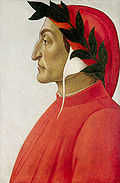- De Monarchia
-
De Monarchia (pronounced Monàrchia) is a treatise on secular and religious power by Dante Alighieri. With this Latin text, the poet intervened in one of the most controversial subjects of his period: the relationship between secular authority (represented by the Holy Roman Emperor) and religious authority (represented by the Pope). Dante's point of view is known on this problem, since during his political activity he had fought to defend the autonomy of the city-government of Florence from the temporal demands of Pope Boniface VIII.
Contents
Date
According to most accepted chronology, De Monarchia was composed in the years 1312-13, that is to say the time of Henry VII of Luxemburg's journey to Italy; according to another, the date of composition has to be brought back to at least 1308; and yet another, moves it forward to 1318, shortly before the author's death in 1321.
Argument
It is made up of three books, but the most significant is the third, in which Dante most explicitly confronts the subject of relations between the Pope and the emperor. Dante firstly condemns the theocratic conception of the power elaborated by the Roman Church and solemnly confirmed by the papal bull Unam sanctam of 1302. The theocratic conception assigned all power to the Pope, making his authority superior to that of the emperor: this meant that the Pope could also legitimately intervene in the matters usually in the sphere of secular authority.
Against this theocratic conception, Dante expressed his need for another strong Holy Roman Emperor and proposed the idea that man essentially pursues two ends: the happiness of earthly life and that of eternal life. Dante argues that to the Pope is assigned the management of men's eternal life (though he still recognizes this as the higher of the two), but to the emperor is assigned the task of leading men towards earthly happiness. From this he derives the autonomy of the temporal sphere, under the emperor, from the spiritual sphere, under the Pope - the pontiff's authority should not influence that of the emperor in their competing tasks.
Dante wanted to demonstrate that the Holy Roman Emperor and the Pope were both human and that both derived their power and authority directly from God. To understand this it is necessary to think that man is the only thing to occupy an intermediate position between corruptibility and incorruptibility. If it is considered that man is only made up of two parts, that is to say the soul and the body, he is corruptible - only in terms of the soul is he incorruptible. Man, then, has the function of uniting corruptibility with incorruptibility. The Pope and Emperor were both human, and no peer had power over another peer. Only a higher power could judge the two "equal swords," as each was given power by God to rule over their respected domains.
See also
External links
- Online text (original)
- Online text (Italian translation)
- (English translation)
- "Return of Dante: the Guelphs and the Ghibellines". The Independent. 19 June 2008. http://www.independent.co.uk/news/world/europe/return-of-dante-the-guelphs-and-the-ghibellines-850012.html. Retrieved 2008-06-19.
Dante Alighieri Works in Latin 
Works in Italian Divina Commedia Characters of
Divina CommediaAlichino · Barbariccia · Ciampolo · Cocytus · Corso Donati · Dis · Eunoe · Forese Donati · Malacoda · Malebranche · Malebolge · Piccarda · Satan · ScarmiglioneInsights In popular culture Dante and his Divine Comedy in popular culture · Après une Lecture de Dante: Fantasia quasi Sonata · Dante crater · Dante Park · The Divine Comedy (symphony) · Dante's Inferno (1924 film) · Dante's Inferno (1935 film) · Dante's Inferno (2007 film) · Dante's Inferno (video game) · Dante's Inferno: An Animated Epic · Dante Symphony · Demon Lord Dante · L'Inferno (film) · Italian battleship Dante Alighieri Book:Dante Alighieri ·
Book:Dante Alighieri ·  Category:The Divine Comedy ·
Category:The Divine Comedy ·  Portal:LiteratureCategories:
Portal:LiteratureCategories:- Medieval Latin literature
- 1312 books
- Books in political philosophy
- Secularism
- Secularism in Italy
- Separation of church and state
- History of the Papacy
- History of Florence
- History of the Holy Roman Empire
- Works by Dante Alighieri
Wikimedia Foundation. 2010.
